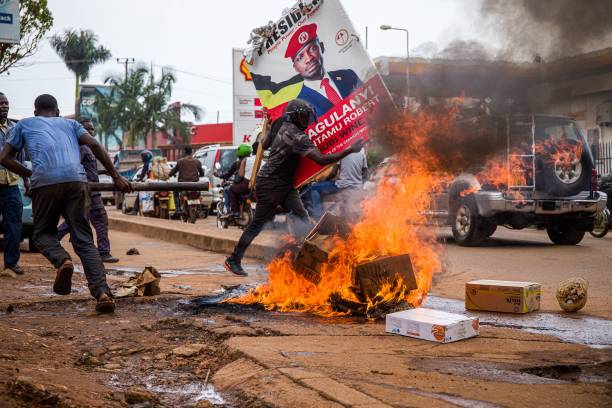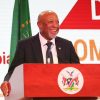
By Luke Melchiorre, Universidad de los Andes
November marks a sombre anniversary in Uganda’s recent political history. In 2020, the east African country’s leading opposition politician, Robert Kyagulanyi, aka Bobi Wine, was arrested. He was on the campaign trail ahead of the 2021 presidential elections.
Mass demonstrations demanding the release of the popular musician-turned-presidential-candidate broke out in and around the capital, Kampala. Over two days, security agents of the regime of Yoweri Museveni – in power since 1986 – cracked down on the protests.
They fired live ammunition into crowds of protesters, killing at least 54 people and injuring many more. The regime arrested over a thousand people. Hundreds more have since been reported disappeared.
Three years on, the effects of the massacre loom large over Uganda’s contemporary politics.
The Ugandan Human Rights Commission recently announced it was closing the files of 18 opposition supporters who remain missing. This has renewed demands for justice and government accountability in connection with the 2020 killings.
In my research, I have charted Kyagulanyi’s unlikely political rise from his landslide victory as an independent candidate in a 2017 parliamentary by-election to his 2021 run for the presidency against Museveni.
Kyagulanyi and his supporters have been subject to arrest, abduction and unlawful detention. They have been tortured and some have been killed.
Given this history, it’s not surprising that the Kyagulanyi-led opposition party, the National Unity Platform, has been at the centre of calls for justice.
Over the last month, the party has spearheaded a boycott of parliament in protest of the Museveni regime’s worsening human rights violations. The opposition has demanded that the state take full accountability for the November 2020 killings and inform Ugandans of the whereabouts of those who remain missing.
With just a little over two years to the next presidential election in 2026, I trace the fallout from the November 2020 massacre to highlight its implications for both the Museveni regime and the Kyagulanyi-led opposition.
Calls for accountability
The initial impetus for a parliamentary boycott came on Uganda’s independence day on 9 October 2023. This followed security officers storming the National Unity Platform’s headquarters. They broke up a prayer meeting of party leaders and families whose loved ones have either died or been disappeared. In the raid, 14 people were arrested.
In addition to the boycott, the National Unity Platform has released a list of 20 Ugandans who have been disappeared, 19 of them since the November 2020 protests. The party routinely posts briefs of the missing on its social media platforms in commemoration of what it calls “Black November”.
The Museveni regime hasn’t budged. However, this pressure has led to some action. According to the leader of the opposition in parliament, Mathias Mpuuga, the human rights commission has started to re-contact the families of the missing to get statements.
International repercussions
The 2020 killings and subsequent arrests and disappearances have had recent international repercussions. At the end of October 2023, for example, US president Joe Biden announced his intention to end Uganda’s participation in the African Growth and Opportunity Act (Agoa) trade programme. Agoa gives exports from qualifying African countries duty-free access to the US market.
In justifying this decision, the White House pointed to the Museveni regime’s “gross violations of internationally recognised human rights”.
This official censure was additionally inspired by Uganda’s recently passed anti-homosexuality law. The White House branded it in May 2023 “a tragic violation of universal human rights”.
There had also been earlier warnings from the US Bureau of African Affairs amid rising levels of state repression during the 2021 election campaign. The bureau said
there will be consequences for those who are continuing to undermine democracy (in Uganda).
Museveni is considered one of the United States’ closest and most reliable military allies in Africa. He has been a “donor darling” of the west for decades. In a New York Times op-ed in 2020, Kyagulanyi labelled Museveni “America’s Favorite African Strongman”.
Indeed, despite the Museveni regime’s worsening human rights record, the US has provided Uganda with hundreds of millions of dollars in development and military aid. This has helped fund the Museveni state’s robust militarisation.
Time will tell if the Biden administration’s Agoa decision is anything more than a slap on the wrist. There are certainly reasons to be sceptical that it is. But given that Uganda currently trades approximately US$200 million in exported goods to the US annually, the decision will have real economic impact.
The Museveni succession
So where does all this leave Kyagulanyi’s party, with just over two years until the country’s next presidential election?
Political rumours about a possible Museveni succession are rife. Some suggest that his son is being groomed to be his political heir.
Despite the Ugandan president “officially” turning 80 next year, opposing him presents the opposition with familiar obstacles.
First, they must contend with unceasing state repression. In September 2023, for instance, Kyagulanyi was received warmly by massive crowds during his tour of Uganda to drum up grassroots support. This campaign, however, was cut short by the government, which accused him of using the rallies to “incite violence (and) promote sectarianism”.
Second, since securing a sixth consecutive victory in elections in 2021, Museveni’s government has co-opted, infiltrated and divided the country’s fragmented opposition.
The country’s second-largest opposition party, the Forum for Democratic Change, for instance, has been mired in a political scandal. It’s been alleged that some of its top leadership accepted campaign funds from Museveni to foil a possible electoral alliance with the National Unity Platform in 2021. Kyagulanyi recently conceded that his party isn’t “really safe from Museveni’s infiltration”.
Finally, Museveni’s grip over Uganda’s military remains strong. This means that any transfer of power through electoral means from Museveni to a Kyagulanyi-led opposition seems unlikely – regardless of how Ugandans actually vote in 2026. Indeed, Kyagulanyi has little connection to Uganda’s powerful military establishment.
All this suggests that as Ugandans memorialise a tragic part of their recent past, their post-Museveni political future remains deeply uncertain.
Luke Melchiorre, Associate Professor, Political Science and Global Studies, Universidad de los Andes
This article is republished from The Conversation under a Creative Commons license. Read the original article.









